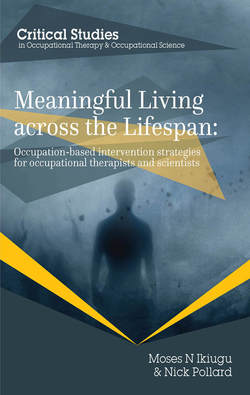Читать книгу Meaningful Living Across the Lifespan - Moses N. Ikiugu - Страница 13
На сайте Литреса книга снята с продажи.
Introductory case
ОглавлениеSarah is 38 years old, married, and she and her husband have 3 children. She is a college professor by profession. Her worker and mother roles take most of her time. For leisure, she likes to exercise, particularly running. She competes annually in the marathon and thinks that running is good for her physical and mental health, enhances her productivity at work, and gives her energy to take care of her children. Her religious faith is also a big part of her life. She says that attending church every week and engaging in activities to foster her faith, and to bring up her children according to church teachings are all very important activities for her. She enjoys watching sports, participating in outdoor activities, and maintaining connections with her extended family.
Sarah states that what gives her life meaning includes: participating in marathon competition; being a good mother and wife; attending church and engaging in other religious activities; watching sports on TV; engaging in outdoor activities; maintaining contact with her extended family; and having a meaningful career that gives her a feeling that she is doing something worthwhile with her life. She feels that because she is able to engage in all the above occupations, she experiences her life as meaningful, and that everything that she is doing has a purpose or a meaning behind it. She sums up her perception of what gives her life meaning as follows:
I think that comes back to whatever I am doing, that I am giving everything that I have to it, that I am putting my best effort into whatever I am doing. It comes back to faith because that’s one of the ways that I demonstrate what my God wants me… that’s how I demonstrate that his love for us is to do everything in our day for him.
Sarah creates meaning in her life by: engaging in leisure occupations that make her feel competent (competing in the marathon); participating in activities that facilitate connection with other people including extended family; loving her family; connecting to a reality that is larger than her (her religious faith), and engaging in a profession in which she feel that whatever she does is worthwhile, that she makes a difference in peoples’ lives. All the above are postulated by Viktor Frankl (1992) as criteria for a meaningful life. In this book, we will use Frankl’s principles as outlined in logotherapy to examine how people can be guided to use their daily occupations to make their lives meaningful just like Sarah’s life as described above.
In addition, because this book is about using occupations in new ways to enhance health and well-being for all people (not just those who have clinical diagnoses), in the final chapter, we offer our thoughts regarding the direction in which occupational science and occupational therapy can go in order to contribute more broadly to addressing broad social concerns. We hope that the ideas presented in this chapter will encourage debate in the profession of occupational therapy and the discipline of occupational science regarding how to join other scientific disciplines in engaging the population to solve major social challenges of our times.
